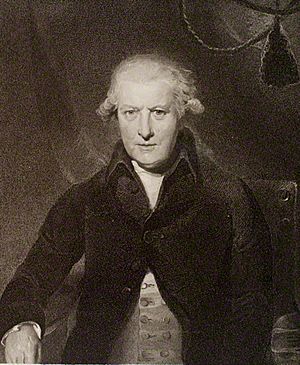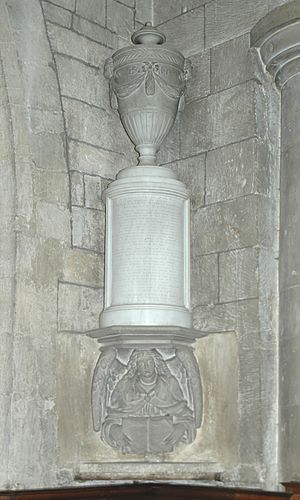William Barrington, 2nd Viscount Barrington facts for kids
Quick facts for kids
The Viscount Barrington
|
|
|---|---|
 |
|
| Chancellor of the Exchequer | |
| In office 19 March 1761 – 29 May 1762 |
|
| Monarch | George III |
| Prime Minister | The Duke of Newcastle |
| Preceded by | Henry Bilson Legge |
| Succeeded by | Sir Francis Dashwood, Bt |
| Member of Parliament for Plymouth |
|
| In office 1754–1778 |
|
| Preceded by | Arthur Stert |
| Succeeded by | Viscount Lewisham |
| Member of Parliament for Berwick-upon-Tweed |
|
| In office 1740–1754 |
|
| Preceded by | Lord Polwarth |
| Succeeded by | John Delaval |
| Personal details | |
| Born | 5 January 1717 Beckett, Shrivenham, Berkshire, England |
| Died | 1 February 1793 (aged 76) Beckett Hall, Shrivenham, Berkshire |
| Political party | Whig |
| Spouse |
Mary Lovell
(m. 1740; died 1764) |
William Wildman Shute Barrington (born January 15, 1717 – died February 1, 1793) was an important British politician. He was known as the 2nd Viscount Barrington. He served in the House of Commons for 38 years, from 1740 to 1778. He is most remembered for his time as Secretary at War. This role meant he helped manage the army during the Seven Years' War and the American War of Independence.
Contents
Early Life and Education
William Barrington was the oldest son of John Barrington, 1st Viscount Barrington. His mother was Anne Daines. He had three younger brothers who also became famous. These included Daines Barrington, Samuel Barrington, and Shute Barrington.
William was taught at home by a tutor named Robert Graham. Later, he went to study in Geneva, Switzerland, in 1735. He spent three years at the university there. In 1734, he inherited his family's lands and title. After his studies, he traveled around Europe on a "Grand Tour." He returned to England in February 1738, when he was 21 years old.
Starting a Political Career
Even though William Barrington had a title, it was an Irish one. This meant he could not sit in the House of Lords in Britain. So, in March 1740, he became a Member of Parliament for Berwick-upon-Tweed. His father had also held this seat before.
At first, Barrington joined the politicians who were against the government. He voted against a bill that would have given the government more power over the navy. He felt this would increase the influence of the "Court Whigs."
Barrington soon found that his new allies were not making the changes they promised. He saw that corruption was not being stopped. He was part of talks in 1744 to form a new government. This new group wanted to remove Lord Carteret and his friends from office. Barrington also voted against a bill that would have suspended people's rights. He believed there was no real proof of a French invasion.
Working for the War Department
The year 1744 was very important for Barrington. He began to support the idea of having a strong standing army. He also voted in favor of government money bills. He helped pass a law to create a national militia, which was a citizen army. This law did not include Catholics or Quakers. He also worked to improve how help was given to poor people.
In 1745, Barrington became one of the Lords Commissioners of the Admiralty. This meant he helped manage the navy. He later had to explain how some money went missing during a war called the War of Jenkins' Ear. In 1746, he helped with the trial of a Scottish general, Simon Fraser, 11th Lord Lovat.
After the war ended in 1748, Barrington suggested reducing the number of soldiers. He also helped create "half-pay" for navy officers. This allowed officers to semi-retire. He proposed that 20,000 sailors be let go. He also helped create a "Quarantine bill" to stop diseases from spreading in the navy and on land. Barrington's ideas also led to a "House of Recovery" in London for sick people.
Becoming Secretary at War
In 1754, the Duke of Newcastle became the new Prime Minister. Barrington asked for a job in the government. In 1755, he became the Master of the Great Wardrobe. This was an important role in the royal household. He was also made a Privy Counsellor.
Later, Barrington was appointed Secretary at War in the Duke of Newcastle's government. He held this job for six years during the Seven Years' War. This was a very complex time for the army. Barrington was known for being very honest and tried to stop corruption in the war office.
Soon after he took office, the island of Minorca was lost to the French. Barrington ordered troops to reinforce Gibraltar, an important naval base. He believed Gibraltar had to be protected. However, there was confusion and a general named Byng was later executed for failing to protect Minorca. Some historians blame Barrington for the confusion, but he was loyal to the King and the government.
During the Seven Years' War, Barrington's brothers, Admiral Sir Samuel Barrington and Major-General John Barrington, were fighting in the Caribbean. John Barrington led the attack that captured the French colony of Guadeloupe. William Barrington remained a loyal friend to the Duke of Newcastle. He was always grateful for the Duke's trust.
Barrington was careful to avoid any accusations of corruption. He refused to agree to the Duke's demand to buy votes in the 1761 election. The war was very expensive, and he was always looking for ways to save money.
Working with King George III
On March 12, 1761, Barrington became the Chancellor of the Exchequer. This meant he was in charge of the country's money. In 1762, he became the Treasurer of the Navy. He remained close to the Duke of Newcastle.
Barrington was likely important in helping the Duke of Newcastle and Cumberland become friends again. He also advised his Whig friends to work with the Tories. Barrington said he joined the new government because he was a loyal "servant of the Crown." The main achievement of this new government was the Peace of Paris in April 1763, which ended the Seven Years' War.
Barrington believed in serving the King and the country, not just one political group. He remained friendly with other important politicians.
In July 1765, Barrington returned to his old job as Secretary at War. He told the King that he was only loyal to him. He said he "detested faction" and would never be part of political groups. He saw himself as a "guardian" of the interests of army officers.
Barrington's main loyalty was to the Army and the King. He believed in working for the country's good. He also helped deal with the Wilkes Riots in 1768-1769. The army was used to control the crowds protesting in London.
The Problem of the Colonies
Barrington was partly blamed for Britain losing the American colonies. In 1765, some politicians wanted to remove the Stamp Act, a tax on the American colonies. But Barrington was among those who believed Americans should pay their share. This strict approach caused problems. The Americans started boycotting British goods, which hurt British companies.
When John Wilkes wanted to take his seat in Parliament, Barrington helped lead the effort to keep him out.
In 1775, Barrington put General Burgoyne in charge of the British forces in North America. Both men believed the navy was key to defeating the American rebels. Barrington thought the army should not chase Americans all over the countryside. However, Burgoyne's defeat at Saratoga was a big loss. This led to Burgoyne's recall to England.
Barrington wanted young officers to either buy their promotions or wait for them based on their experience. He stayed in office until December 1778. He also helped raise more army regiments. He increased the number of places at Old Chelsea Hospital for wounded soldiers. Wages for soldiers improved a little, and they received more care after battles.
Barrington disliked the American Revolution very much. He told the King it made him "sick with worry." He had been a minister for 30 years and wanted to retire. He was 60 years old. The King wanted him to stay as a minister, but Barrington felt he should be in Parliament.
Finally, after Burgoyne's defeat, Barrington felt he could no longer stay in his role. He was allowed to retire in May 1778, but he had to stay at the War Office until Christmas.
Later Life and Retirement
For four months in 1782, Barrington was a joint Postmaster General. This was a high-ranking job. However, the government changed, and Barrington had to resign in April.
The King had given Barrington a pension of £2000 for his public service. When the new government tried to stop this pension, Barrington appealed directly to King George III. The King made sure his pension continued until his death.
Family Life
Lord Barrington married Mary Lovell in 1740. She was a widow. They did not have any children who survived. Mary died in September 1764. Barrington remained a widower for the rest of his life.
He died at his country home, Beckett Hall in Shrivenham, Berkshire, in February 1793. He was 76 years old. He was buried in St. Andrew's parish church in Shrivenham. His nephew, William Barrington, inherited his title.
Legacy
- Barrington, Nova Scotia, is named after him.
Images for kids
See also
- Lord of the Admiralty
- Postmaster General
 | Kyle Baker |
 | Joseph Yoakum |
 | Laura Wheeler Waring |
 | Henry Ossawa Tanner |



